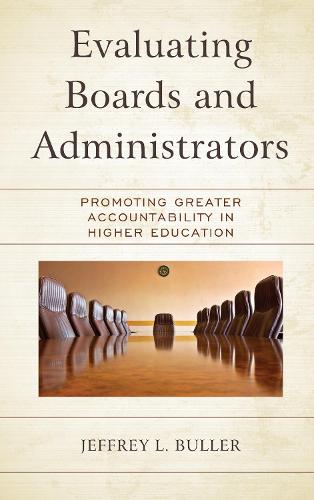
Evaluating Boards and Administrators: Promoting Greater Accountability in Higher Education
(Hardback)
Available Formats
Publishing Details
Evaluating Boards and Administrators: Promoting Greater Accountability in Higher Education
By (Author) Jeffrey L. Buller
Bloomsbury Publishing PLC
Rowman & Littlefield Publishers
1st November 2020
United States
Classifications
Professional and Scholarly
Non Fiction
Higher education, tertiary education
Education: examinations and assessment
379.158
Physical Properties
Hardback
190
Width 162mm, Height 228mm, Spine 20mm
458g
Description
Accrediting agencies and legislatures have become increasingly insistent that governing boards and upper administrators undergo regular evaluation at colleges and universities. Institutions of higher education have a long history of evaluating faculty members and are familiar with best practices for doing so. Offices of human resources include employees with experience in how staff members should be evaluated because these processes are well developed in the corporate world. But how does a college or university effectively evaluate its governing board, and who performs that process How are administrators, particularly the chief executive officer and vice presidents, evaluated fairly and effectively Since a majority of institutions are now required to perform these evaluations, theyre seeking advice and examples of best practices, but there arent resources available to provide these insights. The proposed book will address that critical need. The target audience is college faculty and administrators, particularly those who need to develop or improve a system for evaluating governing boards or administrators because of accreditation requirements or legislative mandate.
Reviews
"Dr. Buller makes a compelling case for extending the evaluation culture prevalent in academic institutions to the most senior leadership - boards and top administrators. He provides excellent examples of best practices used by a handful of academic institutions for evaluating administrators and boards. This is an easy to read book with the most salient points raised in each chapter summarized at the end." --Janeen Hill, founding dean, Crean College of Health and Behavioral Sciences, Chapman University
"As the movement toward greater accountability continues in higher education, there is a clear need for practical and concise methods for evaluating the highest levels of institutional and system administration. Jeff Buller's text provides this guidance. Buller carefully examines and methodically explains best practices for evaluating these important stakeholders in a manner that is engaging. Perhaps most valuable are the real-life case studies, which provide insight into several complex situations. Evaluating Boards and Administrators is a great resource for anyone who participates in the evaluation of senior administration in higher education." --Craig Hlavac, associate dean, College of Arts and Sciences, Southern Connecticut State University
"Buller's work is a great resource in this age of increasing accountability in higher education. He adeptly describes the challenges involved in conducting a meaningful evaluation of higher-level administrators and governing boards, as opposed to a perfunctory "check the box" process. This book provides a helpful discussion on what is really at the crux of board evaluation...defining, observing, and measuring success of the board as a whole and of individual members." --Russell L. Ivy, senior associate provost for academic affairs, Florida Atlantic University
"Evaluating boards and administrators is one of the critically important and often overlooked elephants in the room of higher education. As legislative bodies and accrediting agencies demand greater accountability, colleges and universities will continue to feel the mounting pressure to get this right. Fortunately, Jeff Buller, a seasoned expert and long trusted leader in higher education, has paved the path toward great accountability in higher education with this practical, must-have handbook." --Trey Guinn, associate professor and director of Communication Arts, University of the Incarnate Word
Author Bio
Jeffrey L. Buller is a senior partner in ATLAS Leadership Training, an international partnership that trains administrators and leaders in every aspect of their complex assignments. He holds a doctorate from the University of Wisconsin-Madison and has published twenty other books on educational leadership as well as numerous articles, including nearly two hundred on higher education administration.
